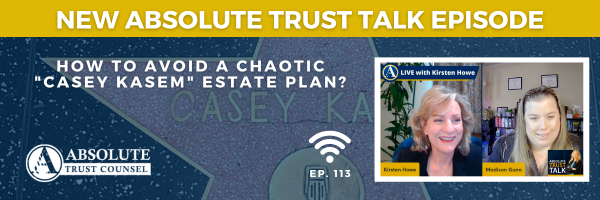Actor and radio personality Casey Kasem occupied a singular place in American popular culture. As he counted down the hits for the week via his show, American Top 40, he was also doing something else that was decidedly more important — providing a sense of consistency that we could all rely on. World affairs might rattle us, and the financial markets volatility might worry us, but regardless of what else was transpiring in the world, we could always count on Casey to entertain us with his one-of-a-kind voice, and all would still seem more or less normal.
Unfortunately, the final chapter of Casey’s own life was anything but ordinary. In 2013, one of Casey’s daughters from his first marriage announced that he had been living with Parkinson’s for six years. However, the diagnosis was later changed to Lewy Body Dementia. Not long after, Casey’s three adult children assembled in front of his house to publicly complain that Jean Kasem — Casey’s wife of 30 years — was intentionally keeping them from their now-incapacitated father.
Things only got more vitriolic and combative, with circumstances pitting Jean Kasem and her reckless and duplicitous behavior against Casey’s three older children.
Join Kirsten Howe and associate attorney Madison Gunn as they examine the circumstances surrounding Casey Kasem’s much-publicized and most unusual passing. We’re not using the term “unusual” loosely here, as several aspects thoroughly separate this case from the estate planning disputes we often see. This conflict didn’t stem from haphazard estate planning, nor was money the source of discord for this blended family. This altercation was centered almost entirely on how Casey’s health care should be administered.
Kirsten and Madison will also look at some new California healthcare legislation — Sections 4711 and 4712 of the California Probate Code and analyze what, if any, difference it might have made had it been in effect while Casey’s unfortunate saga was playing out.
In this episode, we’re going to discuss:
- How even a well-thought-out, comprehensive health care directive and a court-appointed conservatorship can be rendered ineffectual when an involved party chooses to blatantly disregard them.
- Why doctors are inclined to seek authority to treat their incapacitated patients and not pursue the whereabouts of advance health care directives unless those documents are brought to their attention?
- Why proper communication is the most overlooked aspect of estate planning.
- Why Casey’s decision to list his daughter Kerri, and not his wife Jean, as his agent on his health care directive might have reflected his concerns about how Jean might handle such authority.
And much more.
Don’t miss this episode as we highlight some important legal wisdom that could have alleviated the conflict in this estate plan that you should be aware of for your own planning.
Big Three from Episode #113:
- Blended families have a dynamic all their own. While the children, stepchildren, and stepparents may get along just fine, one of the spouses may serve as a lynchpin that keeps the collaborative relationships on an even keel. Those relationships can easily fray when that spouse dies, leading to objectionable and even spiteful behavior.
- California’s new healthcare legislation was implemented to streamline the process of identifying a healthcare surrogate. Should a patient end up in the emergency room, they can verbally inform their treating doctor that they want the friend that transported them — or another person of their choosing — to be their healthcare surrogate. This authority lasts for the duration of the patient’s treatment at a given facility, with a maximum of 60 days. In the event the patient is incapacitated upon admission, Section 4712 of the California Probate Code also lays out a hierarchy of who may be authorized to make medical decisions on their behalf.
- For a variety of reasons, this new legislation may not have had much, if any, effect on Casey Kasem’s situation. We can’t say with any certainty whether or not Casey was lucid enough to nominate a surrogate when he was admitted to his Santa Monica skilled nursing facility, and we don’t necessarily know how long he had been in his treatment facility in Washington when Jean moved him against his doctor’s orders. Taking into consideration doctors’ tendency to expedite the treatment authorization process — especially when it’s a spouse — when they’re treating an incapacitated patient, Jean could have continually moved Casey from facility to facility, which would have re-started the clock on the law’s 60-day limit each time.
Time-stamped Show Notes:
0:00 Introduction
2:13 Let’s start with more details about the dispute involving Casey Kasem’s wife and his children from his first marriage.
3:39 The reason they ended up in court was because one of the daughters claimed Jean, Casey’s wife, was keeping the kids away from their dad.
4:14 Interestingly enough, even though Casey’s eldest daughter was denied, his other daughter was shortly after granted temporary conservatorship.
5:39 Jean’s calculated moves to keep Casey from his children were taken to another level when she took him out of his skilled nursing facility in the middle of the night.
6:58 In court, Jean Kasem stated that Casey had not received nutrition or hydration for an entire weekend.
8:04 Despite Casey’s daughter, Kerri, being both his conservator and health care agent, his body was given to his wife.
10:04 Many medical professionals are often willing just to deal with the spouse in making medical decisions even though it may go against their patient’s previously expressed wishes.
11:59 Even comprehensive incapacity planning may not keep a family out of court because a person could be doing something harmful to their quality of life.
13:25 Did you know? A healthcare agent has the power to make decisions, but the conservator has the right to make decisions. In other words, the agent can act for you if needed, but a conservatorship is the only person allowed to act for you.
15:18 Had Kerri been able to present a letter of conservatorship to doctors while Casey was in his original medical facility in Santa Monica, they only would have listened to what Kerri said.
17:22 Tune in here as Kirsten and Madison examine the details of the California legislation that recently went into effect and how it might — or might not — have altered the trajectory of this case.
20:30 If a patient lacks the capacity to make their own medical decisions, new legislation then lays out a hierarchy for who makes decisions.
22:21 If a person should be deemed incapacitated, they virtually have little to no rights to make decisions on important liberties we typically have as individuals.
23:19 New California legislation allows a healthcare facility to appoint a surrogate for a patient in certain circumstances. Here are the criteria the facility must follow.
25:34 It might seem counterintuitive, but these are the reasons why this new legislation might not have changed the outcome of Casey Kasem’s situation.
27:42 In situations where a patient is unable to name a surrogate, doctors can pick someone, but they aren’t required to.
28:55 Casey named his daughter — not his wife —as his healthcare agent. That’s a little unusual, but this is likely why he did it.
30:11 Communication is the most overlooked aspect of estate planning. Here’s why a lack of appropriate communication might have helped set the course for what transpired in this case — especially considering the length of Casey’s and Jean’s marriage.
32:43 Question: Would Kerri’s status as conservator have provided her with the legal authority in Washington to move Casey to another facility? This would really depend on Washington’s laws, but most likely, Washington would honor a legally executed California document due to the United States Constitution’s Full Faith and Credit clause.
33:53 Question: Would any of the people with legal authority have had the power to keep other family members away from Casey? Yes, if that person has medical decision-making authority, they can. Conservatorships have the highest rank, but healthcare agents also make decisions. This decision could have legal challenges, but it would hold up in court.
Resources/Links Mentioned in this Episode:
- Absolute Trust Talk Episode 106: What’s Left of the Presley Estate? Lessons Learned from Elvis & Lisa Marie
- Absolute Trust Talk Episode 97: Estate Planning Lessons from the Rich and Famous
- Absolute Trust Talk Episode 24: Conservatorship: Powerful Protective Proceedings
- We’re pleased to provide you with a library of e-books to address common estate planning questions and concerns in practical, easy-to-understand language. https://AbsoluteTrustCounsel.com/Resources/.
- ASK KIRSTEN: If you’d like Kirsten Howe to answer your question on the air, please email her at Info@AbsoluteTrustCounsel.com.
[Ad] Are you a resident of Walnut Creek or the greater East Bay needing help with your estate plan? At Absolute Trust Counsel, your family’s safety is our number one priority. We understand how complicated it can be to know if you’re making the right legacy planning decisions, which is why we’re here to make things easier. Schedule a free discovery call, and let’s talk about how we can help build the right plan for you and your family.


